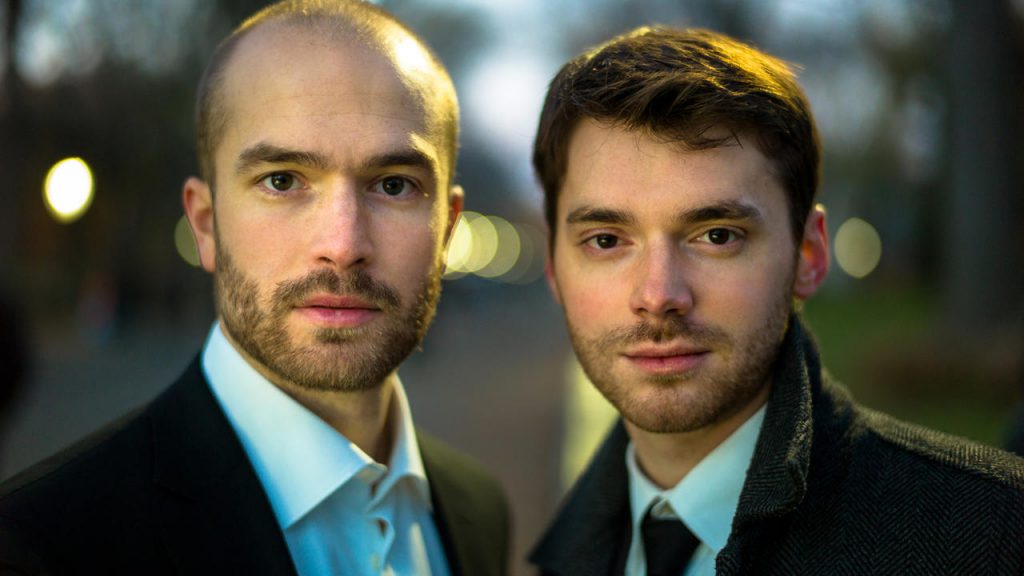Brancy and Dugan close allies in Armistice program for Vocal Arts DC

Baritone John Brancy and pianist Peter Dugan performed at the Kennedy Center Monday night, an event presented by Vocal Arts DC. Photo: Gerard Collett
As a rule in films and elsewhere, the sequel usually disappoints. This was the hurdle for baritone John Brancy and pianist Peter Dugan whose concert observed the centenary of the Armistice. A companion program to their 2014 recital marking the centenary of the start of World War I, Monday night’s event, presented by Vocal Arts DC in the Kennedy Center Terrace Theater, did not quite measure up but yet proved artistically strong on its own merits.
This song recital opened with the unexpected, as Dugan played his own spirited arrangement of the “Jupiter” movement from Holst’s orchestral suite The Planets. A sort of Lisztian paraphrase, it attempted to capture as much as possible from the rollicking original. At its heart was the hymn tune that Holst later set to Cecil Rice’s patriotic poem “I Vow to Thee, My Country,” a beloved commemoration of the losses of World War I.
With the applause not yet ended, Brancy strode onto the stage for “When the Boys Come Home,” a song by Oley Speaks with an idealistic view of the homecoming of soldiers. Brancy’s roaring enthusiasm and the little snippet of The Star-Spangled Banner woven into the final stanza both gave the sense of a patriotic bromide.
This led to the real meat, Ralph Vaughan Williams’ cycle, Songs of Travel. Although perhaps a stretch for a World War I program, having been premiered in 1904, Brancy and Dugan brought home this music’s intense nostalgia for home and the bleak sureness that it can never be regained. Dugan’s excellent rhythmic control kept him always in step with Brancy, as the baritone took time to bring out each word and phrase with exquisite diction. This lively, spontaneous recitation of the words of Robert Louis Stevenson came to a head in “Whither Must I Wander?,” with its echoes of the folk music of the poet’s native Scotland.
In the central part of the recital, the performers featured two new songs by Leonardo Dugan, who happens to be the pianist’s older brother. The musical style, saccharine with Broadway tints, did not seem suited to Alan Seeger’s bleak poem, “I Have a Rendezvous with Death,” which blossomed in an incensed howl of rage in the last lines.
Another poet who died in World War I, John McCrae, wrote the words used in Dugan’s song “In Flanders Fields,” heard in its world premiere. The musical style more aptly underscored the bittersweet reflection on youth lost in war. A brief quotation from the “Mars” movement of Holst’s The Planets, as the pianist pointed out, was a reminder that the real enemy is war itself.
Trumpeter Tosca Penninckx, playing a cornet off stage, sounded “The Last Post,” heard at the close of day in British army camps. The air of wistfulness created by that sound continued in Brancy’s reflective performance of “Where Have All the Flowers Gone?” by folk singer Pete Seeger, the nephew of Alan Seeger.
The theme of poets and musicians who served and sometimes died in World War I also united this recital. A set of German songs interspersed Schubert songs on the theme of alienation with two oddities by Rudi Stephan, a German composer killed in the Great War. Stephan’s harmonic style is dissonant in the manner of early Schoenberg, and the gloomy combination of dark poetry and brooding music made a bracing impact.
Brancy was outstanding in the last Schubert song, “Du bist die Ruh.” While the pacing was glacial, the singer still negotiated the final phrase up to a climactic high note—in full voice the first time and head voice the second. Both performers showed their virtuosic credentials in a set of songs by Rachmaninoff, especially the dynamic, ecstatic “Spring Waters.”
The program lost some narrative focus, with more popular songs by Irving Berlin and Ivor Novello, both veterans of World War I. Berlin’s kooky, gung-ho “Goodbye France” was a highlight, but the Novello songs seemed extraneous.
The concept was saved by the last song, Vaughan Williams’ “I Have Trod the Upward and the Downward Slope,” appended to Songs of Travel after the composer’s death by his widow. Although Vaughan Williams survived his service as a medic in World War I, this song felt like an epitaph to those he had lost.
Surprise returned in the encore—not in the pedestrian choice of “You’ll Walk Alone” from Rodgers and Hammerstein’s musical Carousel, but in Dugan’s artful interweaving of the hymn theme and other music from his arrangement of Holst’s “Jupiter” into it. Jollity was back.
Vocal Arts DC presents baritone Simon Keenlyside and pianist Malcolm Martineau in recital 7:30 p.m. November 30. vocalartsdc.org; 202-669-1463
